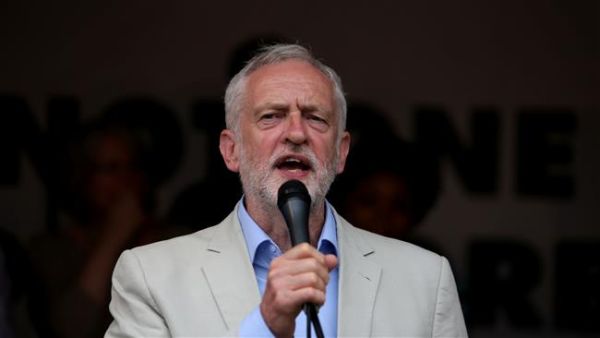By Eleanor Beevor
British opposition leader Jeremy Corbyn is under fire again. This time it is not only for anti-Semitism within the ranks of his Labour party, but for comments he himself made that many believe were anti-Semitic. The remarks that sparked the controversy were from a video of a 2013 conference of the Palestinian Return Centre, in which Corbyn said of British Zionists:
“They clearly have two problems. One is they don't want to study history, and secondly, having lived in this country for a very long time, probably all their lives, they don't understand English irony either.”
An explosion of critical commentary followed. Corbyn’s many detractors framed the video as proof that it is not only elements of the party that are anti-Semitic, but also the leader himself. Meanwhile, even some of Corbyn’s usual supporters said that the remarks were unacceptable. The statement attracted particular ire because it implied that British Jews who supported the existence of Israel were somehow less British for it.
Corbyn responded by denying that he was using “Zionists” as a pejorative label for Jews. Instead, he insisted, he was using the term in the political sense. Opposing commentators have replied that to be anti-Zionist is to be de-facto anti-Semitic. They say that although one can legitimately criticize the policies of the Israeli government without being an anti-Semite, Zionism itself is not a concept that can be criticized without being anti-Semitic.
The truth is that both sides in this argument are being dishonest. Both might know the technical meaning of Zionism, but both would also like to cultivate a taboo around it. By loading the word with a powerful moral judgement, they can deliver a black-and-white narrative, and avoid discussing messy complications. And this is a serious problem.
When “Zionism” becomes embedded with loaded but unspoken meanings, it has real implications for the Israeli-Palestinian conflict. The more that both sides turn the word into an untouchable concept, the more intractable the conflict becomes. This is a destructive state to be in, and it's unnecessary. No one has to abandon their position, or even see a moral equivalence in the conflict, in order to think about what Zionism really means for both sides.
Zionism, in the bare, technical sense, means a belief that the state of Israel should exist, as a state for the Jewish people. The term is traced to the late 19th Century, founded by Nathan Birnbaum and Theodor Herzl, who witnessed horrific anti-Semitism in Europe. Herzl’s activism spurred a degree of Jewish emigration to Palestine, the area that had once been the historic Jewish homeland of Israel. During the colonial partition of the Middle East in the early 20th Century, Jews were promised a homeland in the former nation of Israel by the British Balfour declaration. Several further waves of Jewish immigration to Palestine occurred.
But it was the horrors of the Holocaust that really galvanized large-scale Jewish immigration. It prompted the UN to prepare for a partition of the country to make way for a Jewish state. Then came the 1948 war between Israel and the Arab States, known to Israelis as the War of Independence, and to Palestinians as the Nakba, or catastrophe. Amidst horrible violence, well over half a million Palestinians were expelled from their homes. One traumatised and persecuted population had found a home, while another had been brutally dispossessed.
Zionism, then, is not unlike other socio-political ideologies. It was founded in response to real injustices. It has a basis in a lot of values we see as moral – self-determination, security for an oppressed people, and so on. And it has had troubling and violent consequences in practice. As a political idea, even as a religious one, it deserves neither demonisation, nor a sacrosanct protection from scrutiny.
The problem is that when two very polarised sides of the conflict now speak of “Zionists”, they load their own meanings onto the word. It’s much easier for both sides when the meanings they imply are clear, but left unspoken. If they had to spell them out, then they would also have to concede that not every aspect of their vision is moral. Better, then, to make a word carry with it a blanket moral judgement of your opponent.
To begin with Corbyn. When he spoke of “they”, i.e. “Zionists”, as unwilling to study history, or unable to appreciate irony, it is hard to believe he had a technical definition of Zionism in mind. For if he did, he would effectively be saying that all those who believe that Israel has a right to exist as a Jewish homeland are, by choice, historically and ironically ignorant.
A number of commentators have implied that Corbyn was using “Zionists” as a euphemism for “Jews”. We cannot know for sure – certainly many anti-Semites do this, and Corbyn should not have allowed for that confusion. But given Corbyn’s politics, it is equally if not more plausible to assume that by Zionists, he actually meant right-wing pro-Israeli figures, who are content to deny Palestinians any rights if it means Israel gets maximum advantage. In whichever sense he was using the word in, Corbyn ends up in the wrong.
The difficult truth is that Zionism, in the technical sense, is a major feature of modern Jewish identity. This does not render the concept of Zionism above scrutiny. But it does mean that using “Zionist” as an insult has troubling connotations. A majority of Jews today, across most denominations, have some kind of ideological affiliation to Israel as Jewish state. They would support its right to exist, and its right to security.
Yet these relationships between Jews and Israel are hugely diverse, and extremely complex. Many Jews are deeply uncomfortable with how successive Israeli governments have pursued the Zionist project. Many are horrified by Israel’s mistreatment of Palestinians. And whatever their opinions Jews, like every other people, deserve to be heard as individuals, not as stereotypes.

Israeli and Palestinian activists of the Women Wage Peace movement march in the heart of Jerusalem on October 8, 2017. (MENAHEM KAHANA / AFP)
This is a comment that can be, ironically, extended to some more zealous pro-Israelis. One commentator, criticising Corbyn, described Jews who were critical of Israel as “self-hating Jews”. The idea that Jews cannot criticise Israel, or indeed of a political movement that concerns them without being “self-hating” is an unjust generalisation. This same commentator wrote:
“Anti-Semitism and Anti-Zionism are the same thing. Anti-Zionism is the belief that the State of Israel should not exist. This is not the same as saying, quite legitimately, that you disagree with the policies of this or any other Israeli government; or calling for the reversal of the settlement program in the West Bank; or demanding a return to earlier borders and the creation of the two-state solution.”
This statement challenges careless users of the word Zionism to spell out whether or not they support Israel’s right to exist. That’s a challenge worth making, although whether anti-Zionism is indeed the same as anti-Semitism is not a closed debate. For a start, there are Jews who believe that the present state of Israel should not exist. The Neturei Karta school of Orthodox Haredi Judaism believe that the State of Israel can only be resurrected with the coming of the Messiah. Are they self-hating Jews?
Nor does the argument necessarily hold for non-Jews. Many Palestinians who lost their lands and homes to Israel’s foundation and expansion probably do wish that the state of Israel didn't exist there. Do they hate all Jews for it? Some do. But there are also plenty of Palestinians whose scepticism of Zionism hasn’t translated into hatred for Jews.
There are peace activists who are trying to reach across this divide. There are ordinary Palestinians who are deeply dubious about Zionism, but who would still like better relations with their Jewish neighbours. Similarly, calls for a one-state solution are anti-Zionist, in that they would not make for a definitively Jewish state. Are they anti-Semitic? Well, the justification for a one-state solution is to have Israelis and Palestinians live side by side as equals. Zionists might not like the idea, but that does not make it definitively anti-Semitic.
The other problem of implying that anti-Zionism and anti-Semitism are one and the same is that there are many different visions of what a Zionist state should look like. On one level, it’s true that you can criticise Israeli policy and still support Israel’s right to exist as a Jewish state. But what kind of Jewish state does this Zionism refer to? As always, it depends on who you ask.
Take the recent Israeli nation-state law. Its proponents say that it ensures the Jewish character, and Jewish self-determination of the state that Zionism mandates. Its opponents say that it compromises Israel’s democratic character and reduces non-Jewish Israelis to second-class citizens, because they automatically have a lesser right to shape the country they live in. There are legitimate, and ethically fraught questions about what “Zionism” means for non-Jews in Israel. And those who would rather avoid answering them understandably find it easier to equate critical discussions of Zionism with anti-Semitism.
The proper definition of Zionism matters, but in a polarised debate that’s not enough. Each side needs to be pushed to spell out exactly what they mean by it, and needs to be made to answer the hard questions their view of it comes with. Labour has made plenty of mistakes with the anti-Semitism scandal, and Jeremy Corbyn deserved the reprimand his words provoked. The party must develop the humility to accept when it loses the moral high ground, and it needs to take a much more proactive approach in combatting anti-Semitism.
However, plenty of Corbyn’s detractors have no interest in acknowledging goodwill on Labour’s part in combatting anti-Semitism when it is there. They are hoping the scandal will bring about his political demise, and don’t want to give Corbyn and Labour the chance to learn from their mistakes. Nor are they keen to acknowledge that discussing Palestinian rights will invariably involve difficult questions about visions of Zionism. Some anti-Semites forward their agenda along these lines, but not all who do are anti-Semites.
“Zionist” is not an insult. Nor is it a concept that is above debate. We need to know what it means, and we need to say what we mean. In short, we need to talk about it.







